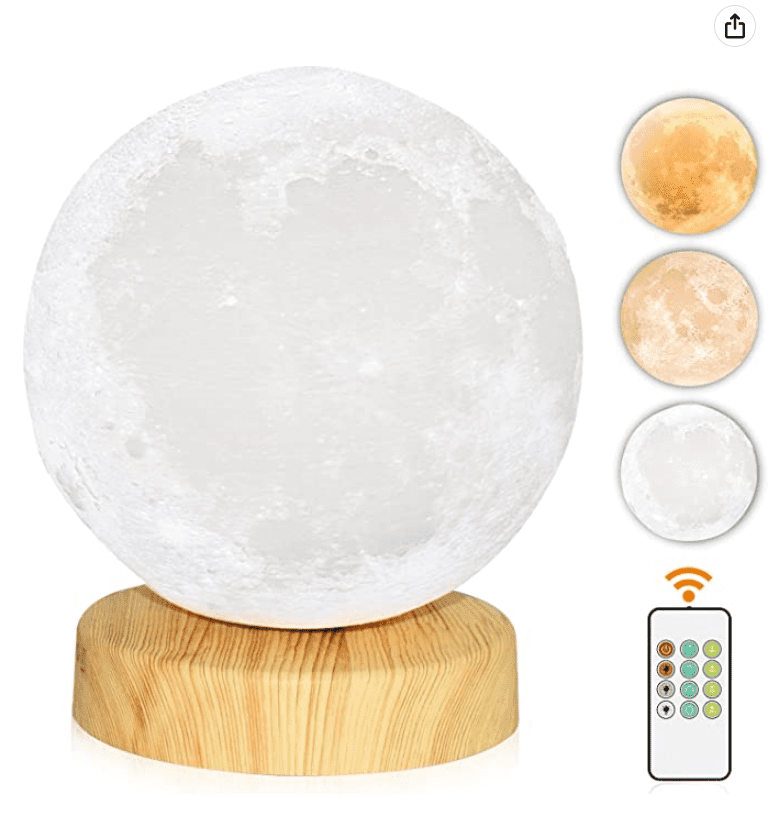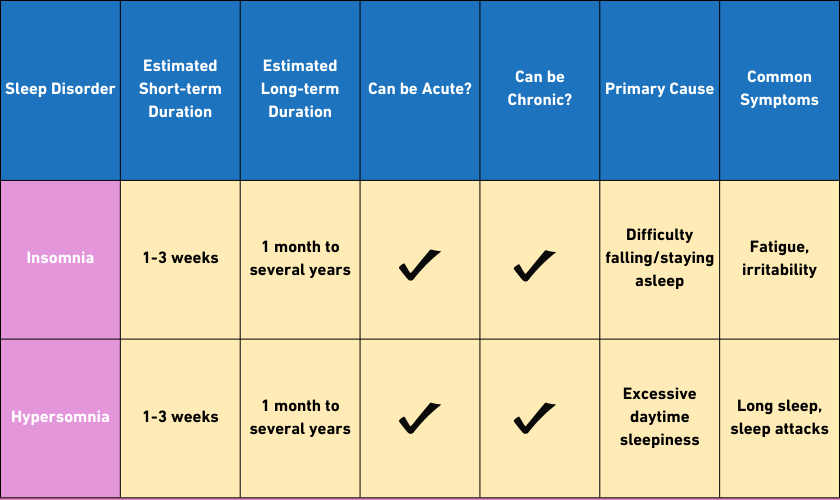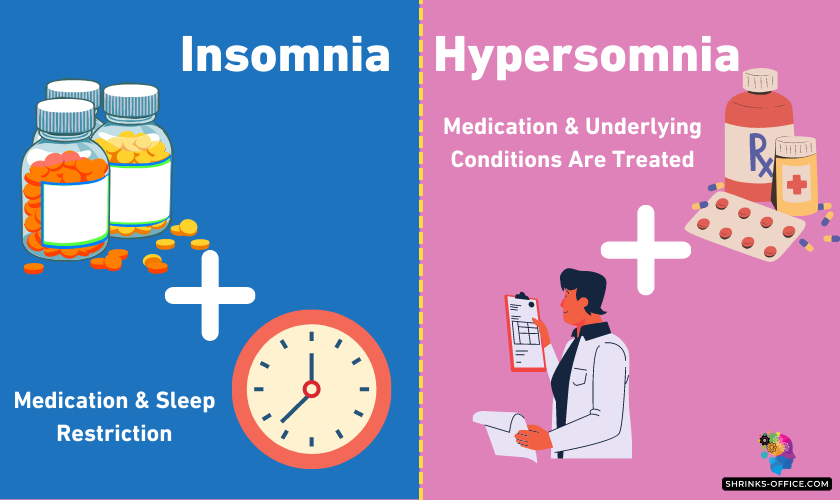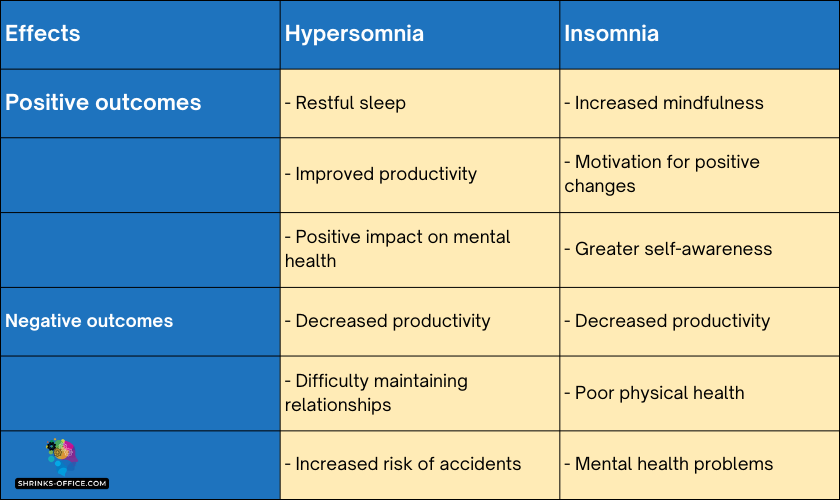Hypersomnia vs. Insomnia: A Comprehensive Comparison
Hypersomnia is characterized by excessive sleepiness, where individuals may sleep for longer periods than usual, have trouble staying awake during the day, or take frequent naps.
Insomnia, on the other hand, is the inability to fall asleep or stay asleep. People with insomnia may struggle to fall asleep at night, wake up frequently during the night, or wake up too early in the morning, leading to insufficient sleep.
Hypersomnia Causes
- Certain medical conditions
- Drug or alcohol misuse
- Disruption to the normal functioning of a part of the nervous system
- Physical problems
Hypersomnia Symptoms
-Excessive daytime sleepiness
- Need to sleep despite having adequate sleep
- Sleep inertia
- Hallucinations
- Sleep paralysis
- Sleep attacks
Hypersomnia Treatment
- Medication
- Sleep hygiene
- Lifestyle changes
- Limit naps
- Cognitive-behavioral therapy (CBT)
- Continuous positive airway pressure (CPAP)
Insomnia Causes
- Age
- Sex
- Family history and genetics
- Stress and anxiety
- Environment
- Occupation changes
- Caffeine
- Alcohol
- Nicotine
- Lifestyle changes
- Medical conditions
Insomnia Symptoms
- Inability to fall asleep
- Inability to stay asleep
- Fragmented sleep
- Early wake-time with difficulty in going back to sleep
Insomnia Treatment
- Sleep hygiene
- Cognitive-behavioral therapy for insomnia (CBT-I)
- Relaxation techniques
- Lifestyle changes
- Over-the-counter sleep aids
- Prescription medication
- Address underlying conditions
For Insomnia
Natrol Melatonin Sleep Aid Gummy
For Hypersomnia
Rsccleaner Light Therapy Lamp®, 10000 Lux with 3 Color Temperatures
Hypersomnia and insomnia are both about sleep. They both end in the same way. But they are different sleep problems. They have things that are the same and things that are different. Let's see how they compare.
Hypersomnia vs. Insomnia

Definition
Hypersomnia makes people very sleepy during the day. People with it want to nap a lot. There are two types: primary and secondary Hypersomnia. [1][3].
- Primary Hypersomnia: People sleep a lot during the day, and we don't know why.
- Secondary Hypersomnia: People are very sleepy because of other problems like sleep apnea, narcolepsy, or medicine side effects.
Insomnia makes it hard for people to sleep. They can't fall asleep or stay asleep easily. This makes them tired during the day. There are two types: acute and chronic insomnia.[4]
- Acute Insomnia: It's short-term, lasting days or weeks. It's often due to stress or changes in life or surroundings.
- Chronic Insomnia: It's a long-term problem that lasts over a month. It can be caused by health issues or medicines.
Important:
Curious about the genetic factors that may contribute to sleep disorders? Our latest article, "Are Sleeping Disorders Genetic? Unraveling The Mysteries," delves into the fascinating world of sleep science to explore the potential hereditary links.

Prevalence of Hypersomnia and Insomnia
- Insomnia: According to various studies, up to 30 percent of adults have insomnia at some point in their lives[10].
- Hypersomnia: According to NIH, approximately 4- 6% of people have Hypersomnia [11].
Hypersomnia and Insomnia Causes
Similarities
These two sleep problems are related. Insomnia's causes are simpler, while Hypersomnia's are more complex. But, causes of insomnia can also lead to Hypersomnia. This is because problems like insomnia or sleep apnea can make someone have Hypersomnia[1].
Differences
The causes of insomnia include[2];
- Age- Older people are more prone to insomnia
- Sex- Women are more prone to insomnia
- Family history and genetics- If a family member has insomnia, then you may be more prone to developing it.
- Stress and anxiety- Stress and anxiety can make it hard to fall asleep or stay asleep.
- Certain medications- such as antidepressants, can also cause insomnia.
- Environment or occupation changes- Changing work hours or changes in light, noise, or temperature can cause insomnia.
- Caffeine, alcohol, and nicotine- Consuming too much of these substances can cause insomnia.
- Other lifestyle changes- Having a baby, starting a new job, working out late, or eating a big meal before bed can cause insomnia.
- Medical conditions- Some health problems like asthma, allergies, arthritis, and back pain can make sleep hard.
On the other hand, Hypersomnia is caused by[1];
- Certain medical conditions- such as multiple sclerosis, encephalitis, depression, epilepsy, or obesity
- Drug or alcohol misuse
- Disruption to the normal functioning of a part of the nervous system
- Physical problems- such as head trauma, tumors, or injuries to the central nervous system
Verdict: The causes of insomnia are more straightforward than the causes of Hypersomnia. Nevertheless, the underlying cause of Hypersomnia can be insomnia itself. It's also important to understand that the root cause of sleep disorders can be genetic, sometimes.
Insomnia and Hypersomnia Symptoms

Similarities
- Poor sleep quality - Both sleep disorders decrease the overall sleep quality and can cause difficulty falling or staying asleep. [5][1]
- Daytime drowsiness [5][1]
- Depressive symptoms [5][1]
- Anxiety symptoms [5][1]
- Reduced ability to concentrate [5][1]
- Memory difficulties [5][1]
Differences
Insomnia Symptoms
- Inability to fall asleep [5]
- Inability to stay asleep [5]
- Fragmented sleep [5]
- Early wake-time with difficulty in going back to sleep [5]
Hypersomnia Symptoms
- Excessive daytime sleepiness [1]
- Need to sleep despite having adequate sleep [1]
- Sleep inertia [1]
- Hallucinations [1]
- Sleep paralysis [1]
- Sleep attacks (in Narcolepsy) [1]
Hypersomnia and Insomnia Diagnosis
Similarities
- Sleep Diary and Medical History- Doctors might ask you to write down when you sleep in a diary. This helps them see how you sleep. They'll also ask about your health, family's health, and how you live to find out why you can't sleep well.[6][7]
- Polysomnography Test- Doctors might do a sleep test called polysomnography for both problems. [6][7]
- Blood Tests- Blood tests can find health problems like thyroid issues or anemia that make sleep hard. [6][7]
- Actigraphy Test- The actigraphy test checks sleep patterns without hurting. Doctors use it to find sleep problems.[6][7]
Differences
[6]

Treatment
Hypersomnia Treatment
Lifestyle Changes
- Establishing a regular sleep schedule
- Practicing good sleep hygiene (e.g., creating a comfortable sleep environment, limiting screen time before bed, and avoiding caffeine)
- Engaging in regular exercise, but not too close to bedtime
Medications
- Stimulants (e.g., modafinil or methylphenidate) to promote wakefulness
- Antidepressants to treat underlying mood disorders contributing to Hypersomnia
- Sodium oxybate for narcolepsy treatment
Behavioral Therapies
- Cognitive-behavioral therapy (CBT) to address underlying psychological issues
- Relaxation techniques, such as deep breathing, progressive muscle relaxation, or meditation, to reduce stress and anxiety [12]
Insomnia Treatment
Lifestyle Changes
- Establishing a consistent sleep schedule
- Practicing good sleep hygiene (e.g., creating a comfortable sleep environment, limiting screen time before bed, and avoiding caffeine and alcohol)
- Engaging in regular exercise, preferably earlier in the day
Medications
- Sleep aids, such as benzodiazepines or non-benzodiazepine hypnotics (e.g., zolpidem, eszopiclone, or zaleplon) for short-term use
- Antidepressants with sedative effects (e.g., trazodone or amitriptyline)
- Melatonin supplements or melatonin receptor agonists (e.g., ramelteon) to regulate sleep-wake cycles
Cognitive-Behavioral Therapies
- Cognitive therapy to identify and change negative thoughts and beliefs about sleep
- Stimulus control therapy to associate the bed and bedroom with sleep and relaxation only
- Sleep restriction therapy to limit the time spent in bed, aiming to increase sleep efficiency
- Relaxation techniques, such as deep breathing, progressive muscle relaxation, or meditation, to reduce stress and anxiety
Alternative Treatments
- Light therapy to regulate circadian rhythms, especially for those with delayed sleep phase syndrome
- Acupuncture or massage therapy to promote relaxation and improve sleep quality [13]

Effects of Hypersomnia and Insomnia on Health and Daily Life
Hypersomnia and insomnia are sleep problems that can really affect someone's life. Both can harm the mind and body, causing many problems.
Effects of Hypersomnia
Hypersomnia can have a debilitating impact on a person's life. Some of the effects of hypersomnia include:
Pros:
- Restful sleep: People with hypersomnia tend to sleep longer than usual, which can result in a more restful and rejuvenating sleep.
- Improved productivity: Hypersomnia and insomnia are sleep issues that can change how someone lives. Both can hurt the mind and body, leading to different problems.
- Positive impact on mental health: Getting enough sleep can help lower the chance of feeling very sad or worried.
Cons:
- Decreased productivity: Even if sleeping a lot can help with work, people might feel slow and find it hard to concentrate.
- Difficulty maintaining relationships: Even if sleeping a lot can help with work, people might feel slow and find it hard to concentrate.
- Increased risk of accidents: Being very sleepy in the day can cause accidents, especially when using big machines or driving.[14]
Effects of Insomnia
Insomnia can make daily life hard and handling tasks tough. Here are its effects:
Pros:
- Increased mindfulness: People with insomnia might value their daily life more, especially when they can't sleep.
- Motivation for positive changes: Insomnia can make people want to live healthier, like eating better and exercising more.
- Greater self-awareness: Insomnia can cause individuals to develop a deeper understanding of themselves and their needs.
Cons:
- Decreased productivity: Chronic insomnia can lead to fatigue and difficulty concentrating during the day, which can have a negative impact on productivity.
- Poor physical health: Insomnia can weaken the immune system, making it difficult to fight off infections, and increase the risk of heart disease, stroke, and obesity.
- Mental health problems: Insomnia can contribute to anxiety, depression, and other mood disorders, exacerbating existing mental health issues. [15]

Types Of Insomnia To Be Aware Of
Insomnia has different types based on how long it lasts, its causes, and signs. Knowing the types helps find the right treatment for each one.
Acute Insomnia (Short-term Insomnia)
Acute insomnia is short-term sleep trouble. It means having a hard time sleeping for a few days or weeks.
Symptoms
- Difficulty falling asleep
- Waking up during the night
- Waking up too early and not being able to fall back asleep
- Not feeling rested after sleep
Causes
- Stress
- Changes in lifestyle or environment
- Illness or pain
- Jet lag or shift work
Chronic Insomnia (Long-term Insomnia)
Chronic insomnia is long-term sleep trouble. It lasts more than a month and makes it hard to sleep or stay asleep.
Symptoms
- Persistent difficulty falling asleep
- Frequent nighttime awakenings
- Waking up too early and not being able to fall back asleep
- Feeling unrefreshed after sleep
Causes
- Underlying medical conditions, such as sleep apnea, restless legs syndrome, or chronic pain
- Medications
- Substance use (caffeine, alcohol, nicotine)
- Mental health issues, such as anxiety or depression
Onset Insomnia
Onset insomnia refers to the difficulty in falling asleep at the beginning of the night.
Symptoms
- Taking more than 30 minutes to fall asleep
- Restlessness while trying to fall asleep
Causes
- Anxiety or stress
- Irregular sleep schedule
- Stimulant use (caffeine, nicotine)
Maintenance Insomnia
Maintenance insomnia means you wake up a lot at night and find it hard to stay asleep.
Symptoms
- Waking up multiple times during the night
- Difficulty falling back asleep after waking up
Causes
- Pain or discomfort
- Nocturia (frequent nighttime urination)
- Sleep apnea or other sleep disorders
Comorbid Insomnia
Comorbid insomnia happens with other health or mind problems. The sleep issues are linked to these other problems.
Symptoms
- Difficulty falling asleep or staying asleep
- Worsening of the comorbid condition's symptoms due to poor sleep
Causes
- Anxiety or depression
- Chronic pain conditions, such as arthritis or fibromyalgia
- Neurological disorders, such as Parkinson's disease or Alzheimer's disease [16]

Types of Hypersomnia That You Should Know
Hypersomnia has different types based on causes and signs. Knowing the types helps find the right treatment for each one.
Primary Hypersomnia (Idiopathic Hypersomnia)
Primary Hypersomnia means you're very sleepy during the day even if you sleep well at night. We don't know why it happens.
Symptoms
- Persistent daytime sleepiness
- Long sleep episodes at night (more than 10 hours)
- Sleep inertia (difficulty waking up and feeling groggy after sleep)
Causes
- Unknown
Secondary Hypersomnia
Secondary Hypersomnia occurs when excessive sleepiness is caused by an underlying medical condition, medication side effects, or another sleep disorder.
Symptoms
- Excessive daytime sleepiness
- Prolonged nighttime sleep
- Sleep inertia
Causes
- Sleep apnea
- Narcolepsy
- Medication side effects
- Other medical conditions, such as multiple sclerosis, encephalitis, depression, or epilepsy
Narcolepsy
Narcolepsy is a neurological sleep disorder characterized by excessive daytime sleepiness, sleep attacks, and other symptoms. There are two types of narcolepsy: Type 1 and Type 2.
Symptoms
- Sudden, uncontrollable sleep attacks
- Sleep paralysis
- Hallucinations
- Cataplexy (sudden loss of muscle control, often triggered by strong emotions)
Causes
- Type 1 narcolepsy is caused by a deficiency of hypocretin, a neurotransmitter that regulates sleep-wake cycles. The deficiency is often due to an autoimmune reaction that destroys hypocretin-producing neurons.
- The cause of Type 2 narcolepsy is still unknown.
Kleine-Levin Syndrome
Levin Syndrome, also called Sleeping Beauty Syndrome, is a rare type of Hypersomnia. It makes you sleep too much for days or even weeks, over and over again.
Symptoms
- Sleep episodes lasting up to 20 hours per day
- Changes in appetite
- Altered behavior, such as irritability, confusion, or hypersexuality
- Memory problems
Causes
- The exact cause of Kleine-Levin Syndrome is unknown, but it is believed to be related to a malfunction in the hypothalamus, the part of the brain that regulates sleep-wake cycles. [17]
Conclusion
Hypersomnia and insomnia are common sleep problems that can affect your daily life. Knowing how they're alike and different can help you figure out which one you might have. If you or someone you know has signs of these sleep issues, it's important to get help from a seek professional assistance for the right diagnosis and treatment plan.
Feel free to share your thoughts and experiences with hypersomnia or insomnia in the comments below. Your words might help others going through the same things.
FAQ
How many hours of sleep is Hypersomnia?
Hypersomnia is typically defined as excessive sleep beyond the normal range or sleeping more than 10 hours a day. However, some people may experience episodes of Hypersomnia that may last up to 16 hours.
Can I have both insomnia and Hypersomnia?
Yes, it is possible to experience both insomnia and Hypersomnia. This condition is observed in some individuals. However, those individuals often had other psychiatric disorders, such as depression. Therefore, seeking professional help for an accurate diagnosis and treatment plan is important.
References
- Hypersomnia
- INSOMNIA Causes and Risk Factors
- Disorders of Excessive Somnolence
- Insomnia What is Insomnia
- Symptoms of Insomnia
- Hypersomnia Tests and Diagnosis
- Insomnia Diagnosis
- Hypersomnia Treatments
- Insomnia Treatments
- Prevalence of Chronic Insomnia
- Hypersomnia
- American Academy of Sleep Medicine Review: Treatment of Narcolepsy and other Hypersomnias of Central Origin
- Research Gate: Management of insomnia: Update and new Approaches
- National Academy Of Medical Science: Causes of Hypersomnia
- Sleep Health Foundation: Insomnia
- Veterans Affairs: Insomnia
- NLM: Hypersomnia
⚠️ Disclaimer: The content of this video is for informational purposes only and is not a substitute for professional medical advice or treatment. Consult a qualified health professional for any medical concerns.